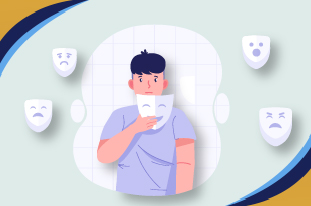Imagine you are having a bad day at your university. After enduring a traumatic event, different people exhibit different trauma responses. The first instinct that comes to a person’s mind is to call the partner or turn to your friend for a swift venting session. However, venting is a natural way to deal with negative emotions, but can it be toxic? Yes, it can be. When you share almost every traumatic thing with your friend or partner, it can become trauma dumping. Trauma dumping is defined as unloading traumatic experiences on others without consent or invitation. Keep reading this article to understand more about trauma dumping and how to avoid it.
What is the definition of Trauma Dumping?
A trauma dump takes place when an individual shares their traumatic experiences without the listener’s consent, most probably at unsuitable times or places. This type can place emotional pressure on the recipient, who cannot handle this much emotional sorrow at one time. Trauma dumping usually involves sharing sad moments from both ends, not overloading the triggering stories from one side.
The most common meaning is sharing an emotional and lacerative story without thinking about its impact on the recipient or as a way to emotionally manipulate the listener.
Trauma Dump Examples
Oversharing on your first date is a classic example of trauma-dumping in a relationship. The dumper does not know about their date well but still shares the emotional information without thinking about how it will affect the listener. Another thing about dumpers is they usually dominate the conversation with lengthy, graphic details about the trauma without allowing the listener to share their thoughts.
Read More: Understanding The Different Types Of Trauma
Why Do People Trauma Dump?
Trauma can be overwhelming, especially childhood trauma, but sharing the laceration with someone can give you relief. However, trauma dumping can also be caused by a lack of coping strategies, like an inability to process the trauma healthily.

Why is Trauma Dumping Bad?
Trauma dumping, or oversharing traumatic experiences without considering the listener’s capacity, is a bad habit as it can be detrimental to the listener. This type of information transfers emotional burden, potentially leading to feelings of isolation and re-traumatization for both the person sharing and the listener.
Venting VS. Trauma Dumping
While understanding traumatic experiences, we need to look at the difference between venting and trauma dumping. Both involve sharing your triggering experiences with others, but they serve different purposes.
Trauma dumping involves unloading personal trauma on another person without thinking about their emotional state. While venting is often a way to share your frustrations with someone you trust to reduce stress. Venting is one of the best solutions for people with schizophrenia and ADHD. Sometimes, venting helps people move on from the situation or solve the problem.
| Trauma Dumping | Venting |
| Oversharing in inappropriate places | Sharing your frustrations with someone |
| Unwilling to find the solutions to the problem | Open to receive problem solutions |
| Jumping from topic to topic quickly | Only talking about one topic at a time |
Read More: The Hidden Mental Scars of Childhood Trauma in Adults
How to Know If You Are Trauma Dumping
Trauma dumping can be incredibly overwhelming for both the person doing the trauma unloading and the person receiving it. How do you know if you’re trauma-dumping? Or how to respond to someone’s trauma dumping? Here are some trauma-dumping examples to look out for:
You feel like you have to get everything off your chest immediately. Holding to negative feelings can be extremely difficult for you.
You start talking without taking a breath. When you talk about your sad moments, you do not see how it impacts the listener; you just speak.
You become extremely attached to one person with whom you share your routine; that person is like a ‘savior’ to you.
Your behaviors start impacting others negatively, especially when you share moments with intense emotions.
You are not getting any relief, even from trauma dumping.
If you or any person you know who does all these things, maybe trauma dump you, you might take him to a psychiatrist. Professional help is always better than these marking techniques.
Read More: Understanding Relational Trauma
Emotional Dumping On Social Media
If we talk about the ideal forum for trauma dumping, social media platforms will stand out. People usually try to get attention by sharing their sad stories, emotional moments, and traumatizing events. There is a phenomenon referred to as sad fishing: a type of social media trauma dumping in which users “fish” for emotional reactions, comments, and likes on their traumatizing stories and posts. When we talk on social media, we are not referring to a specific person or not talking face-to-face, that is why oversharers do not have to worry about the reaction of their friends. It is the solution for oversharers who have to listen to “Why do people trauma dump on me?”.

By sharing their personal experiences, they seek a sense of belonging, look for emotional support, and overcome loneliness, anxiety, and post-traumatic stress disorder (PTSD). Some good people on social media motivate or encourage these types of people with positive comments that help these oversharers deal with trauma.
However, a qualitative study on sad fishing shows that children or adolescents who read sad stories and see sad posts feel even more depressed and stressed out with these posts.
Read More: Trauma Brain Vs Normal Brain: How Trauma Affects The Way We Live
How Do I Stop Trauma Dumping?
To overcome or avoid trauma dumping, we need to understand the importance that talking about traumatic experiences can be healthy, supportive, and positive for the listener and dumper. Trauma dumping manipulation can become a coping mechanism for people who do not look for medical help for their trauma. For people who struggle with mood disorders like bipolar disorder and social anxiety, talking about their issues can help them get relief. If someone trauma dumps, he has to ask these questions himself to understand if he is trauma dumping and also to stop it.
- Why am I sharing this experience?
- Who am I sharing it with?
- When and where are you sharing?
- How often have I talked about this moment with this person or the group?
- What are the other ways that I can get the connection or sense of belonging without sharing these personal moments?
Read More: Understanding The Fawn Trauma Response: What It Is And How It Impacts Us?
Ways to Stop Trauma Dumping
Multiple self-care techniques are used to stop trauma dumping. Another word for trauma dumping is oversharing. To minimize oversharing, you can try out these methods.
Take a Mindful Pause
When you are communicating with someone, stay in the moment and realize when you share something absurd or emotional. By practicing mindfulness, you can stop trauma dumping. Whenever you feel you are sharing more than enough, take deep breaths and get yourself in the present moment.
Ask for Consent Before Discussing Traumatic Topics
Try asking the listener before sharing anything hurtful. You might say, “I’ve been dealing with something tough lately; can I talk to you about it?” This gives the other person the opportunity to say yes or no or suggest a better time to talk. If that person isn’t in the right headspace to talk, that’s okay.
Read More: What Is The Story Behind People Pleasing Trauma Response
Set Personal Boundaries for Sharing
It is good the identify the right person to discuss these types of things. This type of information is personal, and you must share it with trusted people. You might tell your close family members or an old friend. However, you should give him space to talk while sharing otherwise, he might not be comfortable.
Focus on the End Goal
Before sharing your trauma with someone, concentrate on your end goal. What is the purpose of telling? Whether you are looking for comfort, a solution, or just a listening ear, be clear with anyone you are going to chat with. In this way, they can offer you the kind of support you need.
Journaling
Another self-care activity that can help you stop trauma-dumping is journaling. You can write down your feelings, thoughts, and anything rather than sharing it with others. It can also save others from the emotional burden of your traumas. It also reduces the need to talk to others.
Read More: Understanding Trauma Bond Withdrawal Symptoms: Moving on to building healthy relationships
Treatment for Trauma Dumping
Sometimes, you are unable to control your feelings, and after so much self-control, you still share your lacerations with your savior. That is the time when you need medical help. Multiple solutions are available for trauma dumping, including medicated assisted treatment, psychotherapy, and psychiatric medication management. The best solution is psychotherapy.
Psychotherapy
Psychotherapy is also known as talk therapy, it aids in controlling your emotions. Cognitive behavioral psychotherapy is used to manage your negative thought patterns and helps in managing trauma. The second therapy is interpersonal therapy, which helps you tell your trauma to your psychiatrist and get the advice that is required.
Trauma Dumping Treatment at Orange Coast Psychiatry
If you are looking for psychiatric solutions for trauma dumping, Orange Coast Psychiatry is the solution. Whether you need clinical solutions or telehealth services, we have got you covered. Our expert psychiatrists offer telepsychiatry services for all the people across America. From OCD to psychosis, we provide customized, evidence-based treatments for every mental health disorder. Contact us now to get the care you deserve.
Read More: The Vicious Cycle Of Generational Trauma And How It Affects Families
Conclusion
It takes a lot of courage to share your personal experiences with others, but still, dumping trauma onto your loved ones is not a healthy approach. You can try out venting to share your frustrations healthily. To overcome trauma dumping, question yourself about your situation. Social media dumping is also not a good approach for trauma unloading. Medical help can help you manage your trauma and the best place to get the treatment is Orange Coast Psychiatry.
























